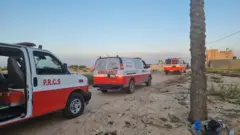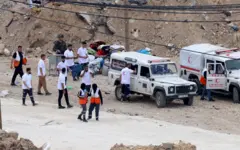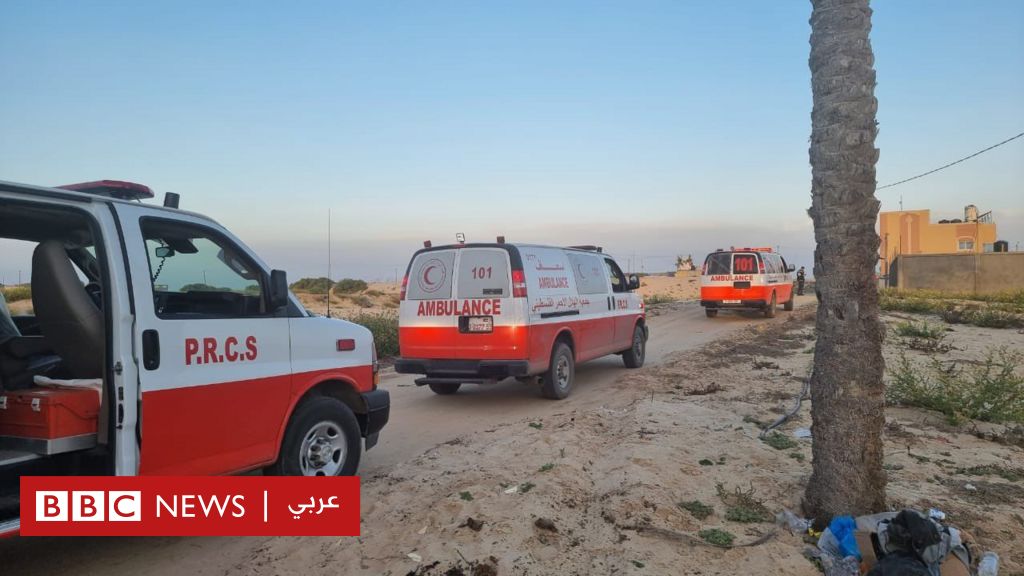
Ahmed, the volunteer in the Palestinian Red Crescent, could not take his time in sadness over the death of his brother because he had to return to his work. “The war does not give an opportunity to cry over loved ones.”
“My brother was trapped in the northern Gaza Strip in a school, and we waited between six or seven hours so that we can reach his body and the bodies of other dead and buried them.”
In the northern Gaza Strip, almost everyone knows Ahmed, the thirtieth young man, who was working as a taxi driver before the war, and became a volunteer with the Palestinian Red Crescent at the beginning of the war.
The volunteer decision was not the result of the war that started in 2023 but rather because of the ongoing wars on the sector in Ahmed, saying, “In May 2004, Israel launched a rainbow operation, and in 2005 until 2014, there is almost a blow or two every year.”
Ahmed obtained a training course in first aid one year before the October 7 War, for a period of 6 months because he is a driver and a paramedic.
Despite the severity of the shelling, Ahmed preferred to stay in the northern Gaza Strip and the non -displacement south because “his duty to help people,” says Ahmed to the BBC.
The International Day of the Crescent and the International Red Cross Network on May 8, was chosen today because it corresponds to the anniversary of the birth of the International Committee of the Red Cross, Henry Donn.
The International Red Cross Day was celebrated, as it was previously known, for the first time in 1948, then the official name of this day changed over time and became known as “World Red Cross and Red Crescent” in 1984.
“The number of volunteers and workers in the Palestinian Red Crescent who have been killed since the beginning of this conflict has now reached 30 people.”
Work during war
Ahmed begins his work at six thirty in the morning, pending the contacts of the people on the number of the hotline of the Red Crescent 101, “and then we head towards the location of the explosion or bombing,” he describes. Ahmed told the BBC that he works for 24 hours and then rests like them.
The Palestinian Red Crescent Society was established in 1968, and is a member of the International Cross and Red Crescent Federation, with 4,200 employees and 10,000 volunteers, and managed 6 hospitals in the Palestinian territories, according to the association’s website.
Ahmed and his companions focus on searching for the injured first, “the dead are martyrs that God takes upon,” he says. The numbers of victims are written in the notebooks that are received in hospitals, so that the number of injured and dead is counted with the knowledge of the Ministry of Health.
The constant bombing of the northern Gaza Strip made access to the victims as difficult as Ahmed describes, and he adds: “The distance that took 5 minutes to reach it became half an hour due to the rubble of buildings everywhere.”
The Central Communication Chamber of Ambulance and Emergency Services is located at the headquarters of the association in Ramallah.
According to the estimates of the Palestinian Central Bureau of Statistics, the number of dead during the war in Gaza reached more than 52 thousand individuals, and the number of dead people from the Palestinian medical personnel reached 1402.
Israel insists that it always adheres to international law in Gaza, and also argues that “the nature of the conflict, in light of the hiding of Hamas fighters among civilians, means sometimes side damage,” according to official Israeli statements.
Ahmed cannot forget the scenes of the destruction that has multiplied more than a year ago, and tells a sad voice: “In many times, contacts are interrupted and we cannot reach the injured, and people in the streets cannot reach hospitals.”

Photo released, Reuters
Volunteers are like the rest of the people
The house of Ahmed and his family were bombed on the third day of the war, saying: “We rented a house, then he was destroyed, so we rented another, and I was displaced with my family consisting of my father, my mother, my younger sister, my brother and his wife 9 times since the beginning of the war.”
More than 1.9 million Palestinians were forcibly displaced and more than 70 percent of housing units were damaged or destroyed, according to United Nations statistics 2024.
Ahmed does not forget the day when his wife was injured in the brain because of the bombing, as he says: “I was always, we helped her, and I promised to practice my work without stopping.”
Ahmed’s wife was displaced to the southern Gaza Strip to get treatment, and Ahmed remained for nearly a year in the north with his parents.
Throughout the war, the loss has become the daily feature of Ahmed’s life, saying: “I lost my colleagues in the Red Crescent, Mandar Al -Sharif, Yusr Al -Masry, and my closest friend Ahmed Dahman.” He silences a little and then says: “By God, our lives are very difficult.”
The Israeli army launched a campaign to eliminate Hamas, in response to its unprecedented attack on October 7, 2023, which killed about 1,200 people and detained 251 others in Gaza, according to Israeli reports.

Ambulance needs support
“From the first moment, the Israeli forces have targeted the ambulance and emergency crews,” said Fares Afana, director of the ambulance unit in Gaza.
On March 23, 2025, while a convoy consisting of 4 ambulances belonging to the Palestinian Red Crescent, two civil defense cars, and a vehicle belonging to the Relief and Works Agency for the Palestinian Refugees (UNRWA) are moving to retrieve the bodies of deaths and ambulances injured, who were subjected to direct shooting from Israeli forces, killed 15 relief and paramedics, and buried them in a mass grave, using a bulldozer, using a bulldozer, using a bulldozer, using a bulldozer The ambulances they were traveling were buried with them.
The Israeli Defense Army announced that “all allegations related to the incident will be examined through the mechanism, and displayed in detail and comprehensive to decide on how to deal with the event.”
According to Afaneh, the Gaza Strip had ten ambulances, but now it has only three vehicles in the northern Gaza Strip and two vehicles in Gaza.
Afaneh emphasizes the sector’s need for more ambulances to meet the calls of distress and the transportation of patients and the wounded, especially with the presence of places with stuck individuals that cannot be reached due to Israel’s targeting of ambulances, as he put it.
Afana also monitors the interruption of communications and the Internet for a very long time, as he says: “All these factors prevent the registration of a large number of missing, dead and wounded.”
Afana also monitors in Gaza that employees and volunteers do not receive their salaries for more than 90 days, which makes the situation more difficult.
Hope for a better tomorrow
In January of this year, thousands of Palestinian displaced people began to return to northern Gaza and were with them Ahmed’s wife, and Ahmed says: “Unfortunately, the Israeli army did not withdraw from all regions, and we work only in places that we are allowed to enter.”
The daily life that Ahmed and his family live are very difficult as he repeats throughout his speech by saying: “Water does not reach only two hours every week, and we cannot grow any food and we are not allowed to move between the north and the south.”
Despite all the destruction of the sector, Ahmed still dreams of the day when the war will end, saying: “The day the crossings will open, my wife and I will travel to Egypt in order to perform a microscopic injection operation … We dream of a child since our marriage ten years ago.”

اترك تعليقاً